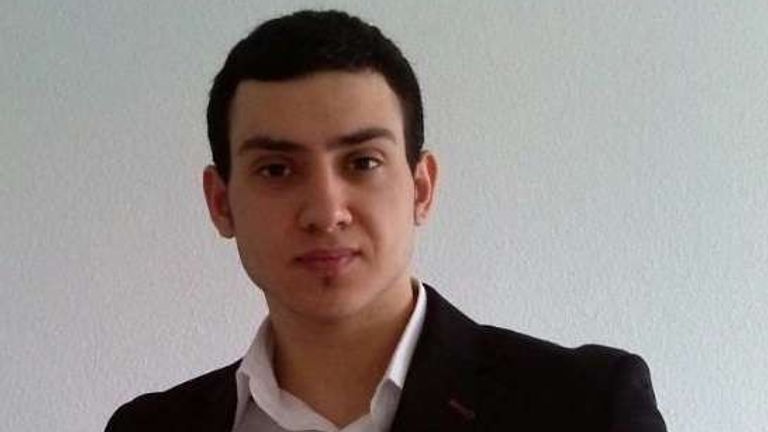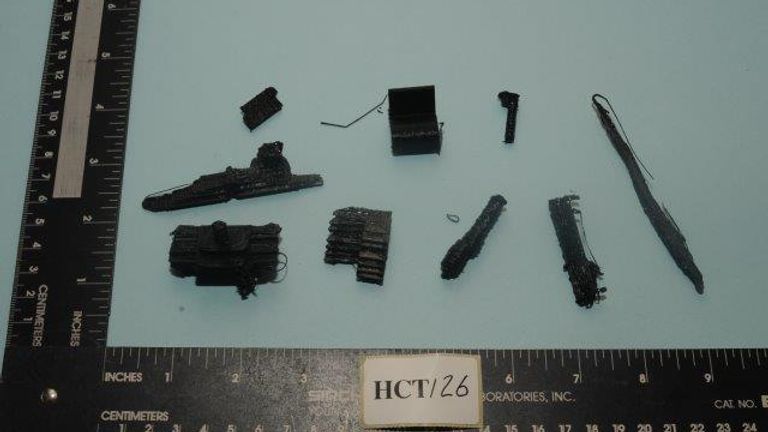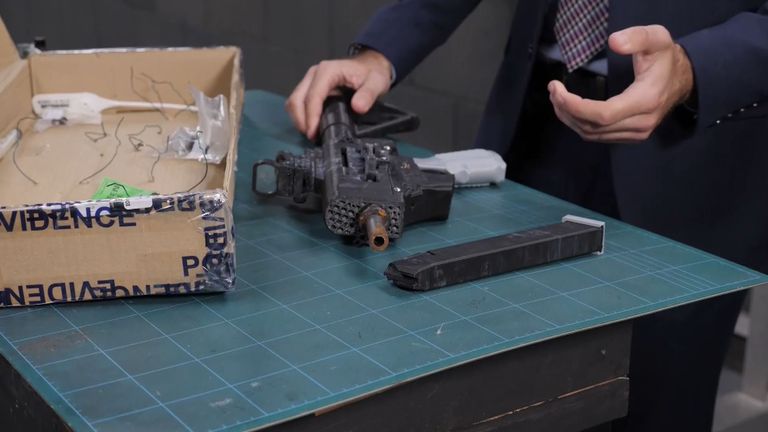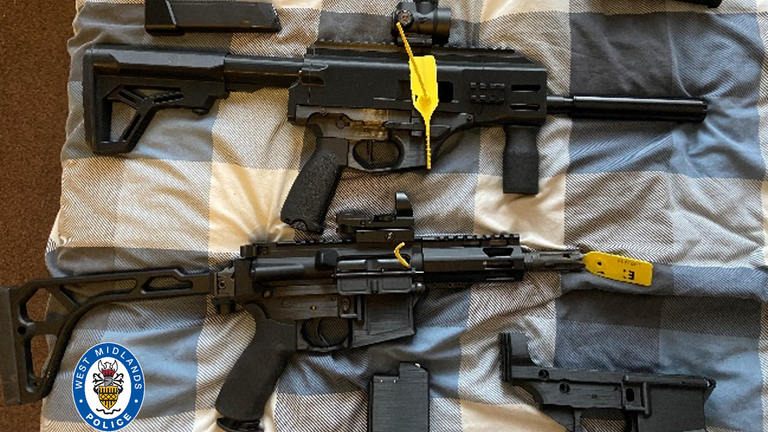Jacob Duygu: Incel who mysteriously died unmasked as creator of world's most popular 3D-printed gun (original) (raw)
The creator of the world's most popular 3D-printed gun has been unmasked as a former member of the German military who died in mysterious circumstances days after he was arrested.
The designer of the FGC-9 (F*** Gun Control 9mm) is named as Jacob Duygu and pictured for the first time in a report published by the International Centre for the Study of Radicalisation (ICSR).
Using the pseudonym "JStark1809", and wearing a distinctive black mask and sunglasses in online video appearances, he took care not to reveal details of his identity.
But open source research by Rajan Basra, a senior research fellow at the ICSR at King's College London, has established he was a German national with Kurdish parents who arrived as refugees from southeast Turkey in the 1990s.
Duygu died of unknown causes in July 2021 after being released from police custody, according to the report.

Image: Jacob Duygu has been named and pictured for the first time. Pic: ICSR
"JStark was hugely influential within the 3D-printed gun world - and that has only increased since his death," Dr Basra told Sky News.
He says Duygu was a so-called incel (involuntarily celibate), with extremist views, having linked him to more than 700 "anonymous" posts on online message board 4chan using authorship attribution techniques.
An incel is an identity used by a subset of men who blame women for their inability to have sex or form relationships and are commonly extremely misogynistic.
Analysis of his digital footprint revealed Duygu was born in Germany in 1992 or 1993, joined the Bundeswehr (Germany's armed forces) in 2015, serving as a junior non-commissioned officer in a logistics unit, and travelled to the Philippines around 2018.
3D-printed gun in hands of terrorists
After returning to Germany, Duygu created a network of 3D-printed gun designers before publishing the digital blueprints for the FGC-9 in 2020 and an updated Mark II version in 2021.
The FGC-9 has been seen in the hands of gun enthusiasts, organised criminals, paramilitaries, insurgents and terrorists around the world and has featured in several criminal cases in the UK.
Neo-Nazi Matthew Cronjager, then 18, was jailed for more than 11 years in October 2021 after he was convicted of preparing for acts of terrorism and other offences.
The Old Bailey heard he had wanted to produce an FGC-9, as well as another model of gun, using a 3D printer as part of his plan to shoot an Asian friend.
British teenager Daniel Harris, whose far-right extremist videos influenced Payton Gendron - the gunman in a mass shooting at a supermarket in Buffalo, New York - was also convicted of a terrorism offence, relating to a 3D printer he was using in an attempt to make firearm parts for one of the guns.

Image: Daniel Harris was convicted of a terrorism offence

Image: Daniel Harris's 3D-printed gun parts
And forklift truck driver David Biddell-Portman, 30, was jailed for five years in June after using a 3D printer to make two weapons, including an FGC-9.
A Sky News investigation last year found the files needed to print a gun can be downloaded in as little as three clicks.
In June last year, the Metropolitan Police said four 3D-printed guns had been recovered since 2018, including an FGC-9 recovered in September 2021 in a borough in northeast London.

Image: The Met Police has recovered 3D-printed guns, including this FGC-9

Image: Forklift truck driver David Biddell-Portman used a 3D printer to make two weapons, including an FGC-9
Since his death, Duygu has been hailed as a martyr for the right to bear arms by 3D-printed gun enthusiasts.
In October 2021, referring to him as "Jacob D", Der Spiegel reported that German authorities had raided his flat in late June 2021 and brought him in for questioning.
He was found dead aged 28 two days later in a car parked outside his parents' home in Hannover, according to the German publication.
The ICSR report says Duygu adopted the JStark persona in homage to Major General John Stark, an officer in the American War of Independence, and adopted his 1809 slogan "live free or die".

Image: JStark has been unmasked as Jacob Duygu. Pic: ICSR
Writing under his pseudonym, Duygu said he was sharing 3D-printed gun designs to help people resist tyranny and defend against authoritarianism, speaking out against xenophobia and racism.
But in hundreds of previously anonymous messages attributed to Duygu in the report, he regularly made misogynistic, racist and antisemitic comments, threatened violence, and spoke about his life as an incel.
The posts included threats to kill "traitors" of Germany and he lamented how a "right-wing" terrorist group had not emerged.
Life as an incel
Duygu told how he felt his autism, height, looks, and ethnicity would destroy his chances of having a sexual or romantic relationship in Germany.
In 2018, he travelled to the Philippines in an attempt to escape his life as an incel, according to the ICSR report.
Shortly before his arrest in June 2021, he wrote: "I will literally kill, or kill myself soon if I can't sleep in a bed with a girl again."

Image: Duygu was in the German military. Pic: ICSR
Dr Basra said: "He believed it was a human right to possess a gun, and he spoke about using guns to fight against tyranny.
"But according to his worldview, the country of his birth - Germany - was tyrannical, as it has gun control laws. And in the comments I've uncovered, he supported anti-State terrorism - something he never said using the 'JStark' name.
"But the 'JStark' name was just a persona, and behind the mask he had another life, and being an incel was a key part of his identity.
"He had this contradiction: he wanted love and intimacy from women but also resented women for 'denying' him that. He was deeply misogynistic, and often came across angry, frustrated, and very lonely.
"His story shows the dangerous overlaps that can exist between these niche online subcultures - with 'JStark', it was inceldom and 3D-printed guns.
"There were plenty of warning signs, but fortunately he ultimately didn't decide to act out violently on his incel beliefs."